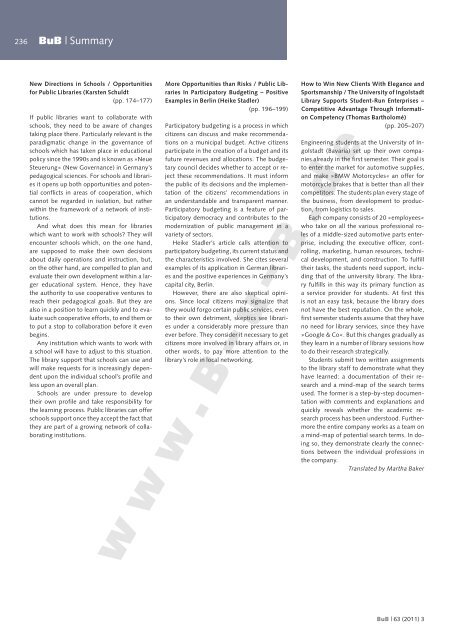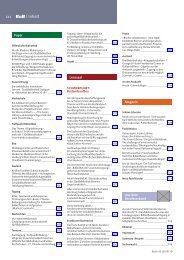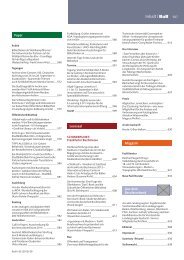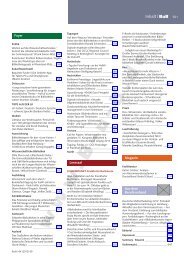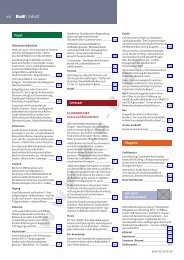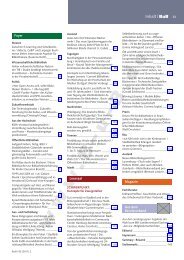www .B–u–B.de Schwerpunkt
www .B–u–B.de Schwerpunkt
www .B–u–B.de Schwerpunkt
Sie wollen auch ein ePaper? Erhöhen Sie die Reichweite Ihrer Titel.
YUMPU macht aus Druck-PDFs automatisch weboptimierte ePaper, die Google liebt.
236 BuB | Summary Lesesaal<br />
New Directions in Schools / Opportunities<br />
for Public Libraries (Karsten Schuldt<br />
(pp. 174–177)<br />
If public libraries want to collaborate with<br />
schools, they need to be aware of changes<br />
taking place there. Particularly relevant is the<br />
paradigmatic change in the governance of<br />
schools which has taken place in educational<br />
policy since the 1990s and is known as »Neue<br />
Steuerung« (New Governance) in Germany’s<br />
pedagogical sciences. For schools and libraries<br />
it opens up both opportunities and potential<br />
conflicts in areas of cooperation, which<br />
cannot be regar<strong>de</strong>d in isolation, but rather<br />
within the framework of a network of institutions.<br />
And what does this mean for libraries<br />
which want to work with schools? They will<br />
encounter schools which, on the one hand,<br />
are supposed to make their own <strong>de</strong>cisions<br />
about daily operations and instruction, but,<br />
on the other hand, are compelled to plan and<br />
evaluate their own <strong>de</strong>velopment within a larger<br />
educational system. Hence, they have<br />
the authority to use cooperative ventures to<br />
reach their pedagogical goals. But they are<br />
also in a position to learn quickly and to evaluate<br />
such cooperative efforts, to end them or<br />
to put a stop to collaboration before it even<br />
begins.<br />
Any institution which wants to work with<br />
a school will have to adjust to this situation.<br />
The library support that schools can use and<br />
will make requests for is increasingly <strong>de</strong>pen<strong>de</strong>nt<br />
upon the individual school’s profile and<br />
less upon an overall plan.<br />
Schools are un<strong>de</strong>r pressure to <strong>de</strong>velop<br />
their own profile and take responsibility for<br />
the learning process. Public libraries can offer<br />
schools support once they accept the fact that<br />
they are part of a growing network of collaborating<br />
institutions.<br />
More Opportunities than Risks / Public Libraries<br />
In Participatory Budgeting – Positive<br />
Examples in Berlin (Heike Stadler)<br />
(pp. 196–199)<br />
Participatory budgeting is a process in which<br />
citizens can discuss and make recommendations<br />
on a municipal budget. Active citizens<br />
participate in the creation of a budget and its<br />
future revenues and allocations. The budgetary<br />
council <strong>de</strong>ci<strong>de</strong>s whether to accept or reject<br />
these recommendations. It must inform<br />
the public of its <strong>de</strong>cisions and the implementation<br />
of the citizens’ recommendations in<br />
an un<strong>de</strong>rstandable and transparent manner.<br />
Participatory budgeting is a feature of participatory<br />
<strong>de</strong>mocracy and contributes to the<br />
mo<strong>de</strong>rnization of public management in a<br />
variety of sectors.<br />
Heike Stadler’s article calls attention to<br />
participatory budgeting, its current status and<br />
the characteristics involved. She cites several<br />
examples of its application in German libraries<br />
and the positive experiences in Germany’s<br />
capital city, Berlin.<br />
However, there are also skeptical opinions.<br />
Since local citizens may signalize that<br />
they would forgo certain public services, even<br />
to their own <strong>de</strong>triment, skeptics see libraries<br />
un<strong>de</strong>r a consi<strong>de</strong>rably more pressure than<br />
ever before. They consi<strong>de</strong>r it necessary to get<br />
citizens more involved in library affairs or, in<br />
other words, to pay more attention to the<br />
library’s role in local networking.<br />
How to Win New Clients With Elegance and<br />
Sportsmanship / The University of Ingolstadt<br />
Library Supports Stu<strong>de</strong>nt-Run Enterprises –<br />
Competitive Advantage Through Information<br />
Competency (Thomas Bartholomé)<br />
(pp. 205–207)<br />
Engineering stu<strong>de</strong>nts at the University of Ingolstadt<br />
(Bavaria) set up their own companies<br />
already in the first semester. Their goal is<br />
to enter the market for automotive supplies,<br />
and make »BMW Motorcycles« an offer for<br />
motorcycle brakes that is better than all their<br />
competitors. The stu<strong>de</strong>nts plan every stage of<br />
the business, from <strong>de</strong>velopment to production,<br />
from logistics to sales.<br />
Each company consists of 20 »employees«<br />
who take on all the various professional roles<br />
of a middle-sized automotive parts enterprise,<br />
including the executive officer, controlling,<br />
marketing, human resources, technical<br />
<strong>de</strong>velopment, and construction. To fulfill<br />
their tasks, the stu<strong>de</strong>nts need support, including<br />
that of the university library. The library<br />
fulfills in this way its primary function as<br />
a service provi<strong>de</strong>r for stu<strong>de</strong>nts. At first this<br />
is not an easy task, because the library does<br />
not have the best reputation. On the whole,<br />
first semester stu<strong>de</strong>nts assume that they have<br />
no need for library services, since they have<br />
»Google & Co«. But this changes gradually as<br />
they learn in a number of library sessions how<br />
to do their research strategically.<br />
Stu<strong>de</strong>nts submit two written assignments<br />
to the library staff to <strong>de</strong>monstrate what they<br />
have learned: a documentation of their research<br />
and a mind-map of the search terms<br />
used. The former is a step-by-step documentation<br />
with comments and explanations and<br />
quickly reveals whether the aca<strong>de</strong>mic research<br />
process has been un<strong>de</strong>rstood. Furthermore<br />
the entire company works as a team on<br />
a mind-map of potential search terms. In doing<br />
so, they <strong>de</strong>monstrate clearly the connections<br />
between the individual professions in<br />
the company.<br />
Translated by Martha Baker<br />
<strong>www</strong>.<strong>B–u–B</strong>.<strong>de</strong><br />
BuB | 63 (2011) 3


